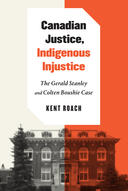
The Supreme Court on Trial
Judicial Activism or Democratic Dialogue
- Publisher
- University of Toronto Press
- Initial publish date
- Sep 2016
- Category
- Judicial Power, Federal, Constitutional, Courts
-
Paperback / softback
- ISBN
- 9781552210543
- Publish Date
- Oct 2001
- List Price
- $29.95
-
eBook
- ISBN
- 9781552216194
- Publish Date
- Sep 2016
- List Price
- $41.00
Add it to your shelf
Where to buy it
Description
Shortlisted for the 2002 Donner Prize (first edition)
The Supreme Court of Canada has been accused of usurping Canadian democracy on a long list of divisive topics, including assisted dying, sex work, supervised injection sites, same-sex marriage, labour relations, election spending, and health care policy. Some critics claim that the nine unelected judges on Canada’s highest Court have used the Canadian Charter of Rights and Freedoms to impose their own views on public policy over those of elected governments. This book joins the crucial debate about the Charter, the Court, and Canadian democracy, and was shortlisted for the Donner Prize in public policy when originally published.
Some of the questions that Kent Roach considers in this important and timely book include: What is judicial activism? Is the Charter making us more like America, where the political nature of the judges appointed to the Court has become critical? Can judges simply read their own political preferences into the Charter? Are judges captive to special interests? What can governments and people do when they think the Court has got it wrong?
This revised edition updates the continued dialogue between the Court and Canadian governments and society over Charter issues, including recent dialogues about assisted dying and supervised injection sites. It also responds to criticisms from some commentators that the dialogue between courts and the government is a fraudulent and undemocratic monologue, and from others who believe that this dialogue can undermine the rule of law. In short, The Supreme Court on Trial makes an important contribution to understanding the role of the Court and the Charter in our democracy.
About the author
Kent Roach is a professor of law and the Prichard-Wilson Chair of Law and Public Policy at the University of Toronto Faculty of Law. He is a graduate of the University of Toronto and of Yale University, and a former law clerk to Justice Bertha Wilson of the Supreme Court of Canada. Professor Roach has been editor-in-chief of the Criminal Law Quarterly since 1998. In 2002, he was elected a Fellow of the Royal Society of Canada and in 2013 he was one of four academics awarded a Pierre Elliott Trudeau Fellowship. He is the author of twelve books, including Constitutional Remedies in Canada (winner of the Walter Owen Prize); Due Process and Victims’ Rights (shortlisted for the Donner Prize); The Supreme Court on Trial (shortlisted for the Donner Prize); Brian Dickson: A Judge’s Journey (winner of the Dafoe Prize; co-authored with Robert J. Sharpe); and The 9/11 Effect: Comparative Counter-Terrorism (winner of the David Mundell Medal). He is the co-editor of several collections of essays and published casebooks, including most recently Comparative Counter-Terrorism Law, which arose from his role as General Reporter on Counter-Terrorism Law for the XIX International Congress on Comparative Law held in 2014. With Justice Robert Sharpe, he is the co-author of The Charter of Rights and Freedoms volume in Irwin Law’s Essentials of Canadian Law series. False Security: The Radicalization of Canada’s Terror Law, co-authored with Craig Forcese, was published by Irwin Law in 2015. He has also written over 200 articles and chapters published in Australia, China, Hong Kong, India, Israel, Italy, Kenya, Singapore, South Africa, Sweden, the United Kingdom, and the United States, as well as in Canada. Professor Roach has served as research director for the Inquiry into Pediatric Forensic Pathology in Ontario (the Goudge Inquiry) and for the Commission of Inquiry into the Investigation of the Bombing of Air India Flight 182. In both capacities, he edited multiple volumes of research studies. He served on the research advisory committee for the inquiry into the rendition of Maher Arar and the Ipperwash Inquiry into the killing of Dudley George. He was a special advisor to the Truth and Reconciliation Commission on Residential Schools. Professor Roach has represented Aboriginal and civil liberties groups in many interventions before the courts, including Gladue, Wells, Ipeelee, and Anderson on sentencing Aboriginal offenders; Latimer on mandatory minimum sentences; Stillman, Dunedin Construction, Downtown East Side Sex Workers, and Ward on Charter remedies; Golden on strip searches; Khawaja on the definition of terrorism; and Corbiere and Sauvé on voting rights. He is the faculty lead for the Asper Centre for Constitutional Rights.
Editorial Reviews
*[The courts'] dilemma has been how to reconcile their new role as active guardians of fundamental values with the democratic values and traditions of Canadian society.... ...An excellent and sophisticated guide to this continuing challenge is offered by Kent Roach in The Supreme Court on Trial: Judicial Activism or Democratic Dialogue (Irwin Law, 2001).... Roach puts forward a balanced approach that insists that activism is less about whether judges rely on political preferences at all and more about the sources of such values and the extent to which they rely on them.*
Other titles by

Wrongfully Convicted (Updated and Expanded Edition)
Guilty Pleas, Imagined Crimes, and What Canada Must Do to Safeguard Justice
Criminal Law, 8/e

Canadian Policing
Why and How It Should Change
The Charter of Rights and Freedoms, 7th edition

Canadian Justice, Indigenous Injustice
The Gerald Stanley and Colten Boushie Case

Criminal Law, 7/e

False Security
The Radicalization of Canadian Anti-Terrorism

Criminal Law, 6/e

Acting for Freedom
Fifty Years of Civil Liberties in Canada

Acting for Freedom
Fifty Years of Civil Liberties in Canada